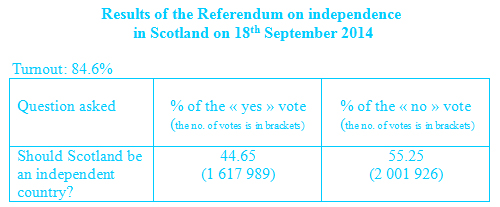Results
Elections in Europe
Corinne Deloy,
Helen Levy
-

Available versions :
EN

Corinne Deloy
Helen Levy
On 18th September most of the 4.25 million Scottish residents called to ballot said "no" to independence. 55.25% of them said no to the question: "Should Scotland be an independent country?" This has put to rest - for a few years at least - the dreams of independence nurtured by the Scottish Nationalist Party (SNP) and its government leader Alex Salmond.
The victory of the "no" was finally greater than forecast by the polls. The "yes" won (53.49%) in the biggest Scottish city, Glasgow, as well as in Dundee (57.35%), a city on the east coast. The constituency of West Dunbartonshire (centre) also voted in its majority for independence (53.96%). However, Edinburgh mainly voted "no" (61.1%), just like the country's third city Aberdeen (56.61%).
The supporters of independence failed to convince the majority of the electorate of the economic advantages that an independent Scotland would enjoy.
Although no minimal turnout was required to validate the vote, the Scots turned out en masse for this election: 84.6% of them voted which is an historic record since the introduction of universal suffrage in the UK in 1918.
 Source : http://scotlandreferendum.info/
Source : http://scotlandreferendum.info/"It is time for our UK to rally and move forwards," declared Prime Minister David Cameron (Conservative Party) when the results were announced indicating that the question of Scotland's independence was now "settled for a generation". "There can be no challenge, no new consultation. We have heard clearly what the Scots had to say," maintained the leader of the British government who promised to grant greater powers to the northern region of the UK as well as England, Wales and Northern Ireland.
David Cameron also highlighted the fact that Scottish and Welsh MPs, who were members of the House of Commons in London, the lower chamber of the British parliament, are allowed to on issues involving England (healthcare and education for example) whilst English MPs are not allowed to do the same regarding health and education issues in Scotland or Wales - which is a vital point for the English electorate according to the British Prime Minister.
"Westminster's pretention to holding authority over the entire country is dead and buried," stressed former Prime Minister (2007-2010) Gordon Brown (Labour Party). The leader of the main opposition party Ed Miliband indicated that the Scottish referendum was going to "change the way England is led, with the need for greater power, locally, from Cornwall to Cumbria."
A poll published two days ago by ITV News revealed that nearly half of the Britons supported the idea of granting greater power to town councils as well as English and Welsh regions. In Yorkshire, which is England's biggest country a campaign entitled Yorkshire First was launched just a few weeks ago in order to gain more local power.
The leader of the Scottish Nationalist Party (SNP), Alex Salmond, acknowledged defeat. "Scotland has decided by a majority not to become independent. I accept the verdict of the ballot and call on all Scots to do the same and accept the people's decision," he stressed, but he did congratulate the 1.5 million Scots who did vote for the "yes". The supporters of independence also called on London to respect its promise to transfer greater powers to Edinburgh as quickly as possible.
At the beginning of August the Conservative Party, Labour and the Liberal-Democrats, the three main British parties, joined forces in a coalition "Better Together" to defend British Scotland and promised to increase Scotland's autonomy if the "no" vote won. Scotland may now benefit from greater powers in terms of taxation (authority to increase taxes) and social security after the next general elections planned for the spring of 2015.
In spite of the vote against independence Scotland's path to autonomy is due to continue and the referendum on 18th September marks the beginning of a new round of negotiations between London and Edinburgh which might quickly lead to "devo max" i.e. greater autonomy for this northern part of the UK.
On the same theme
To go further
Elections in Europe
Corinne Deloy
—
15 April 2025
Elections in Europe
Corinne Deloy
—
25 February 2025
Elections in Europe
Corinne Deloy
—
18 February 2025
Elections in Europe
Corinne Deloy
—
28 January 2025

The Letter
Schuman
European news of the week
Unique in its genre, with its 200,000 subscribers and its editions in 6 languages (French, English, German, Spanish, Polish and Ukrainian), it has brought to you, for 15 years, a summary of European news, more needed now than ever
Versions :



